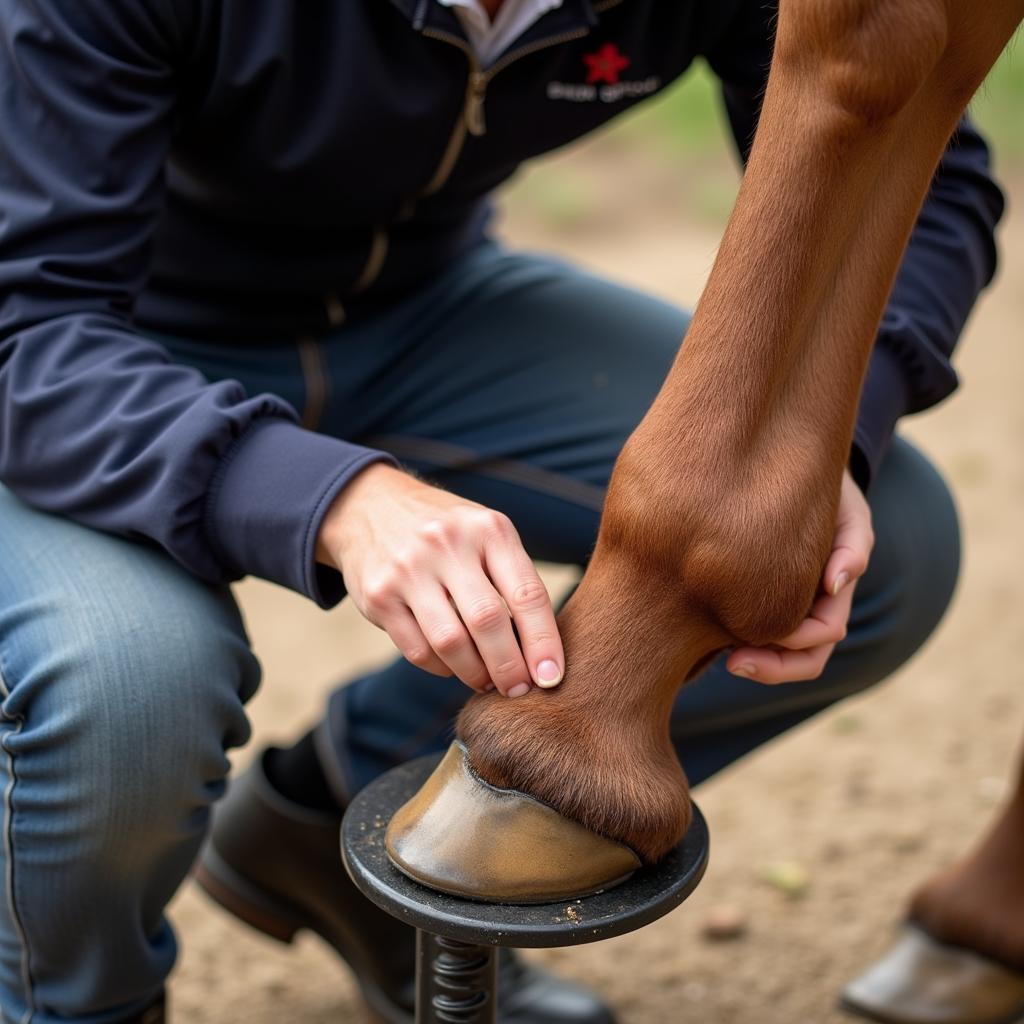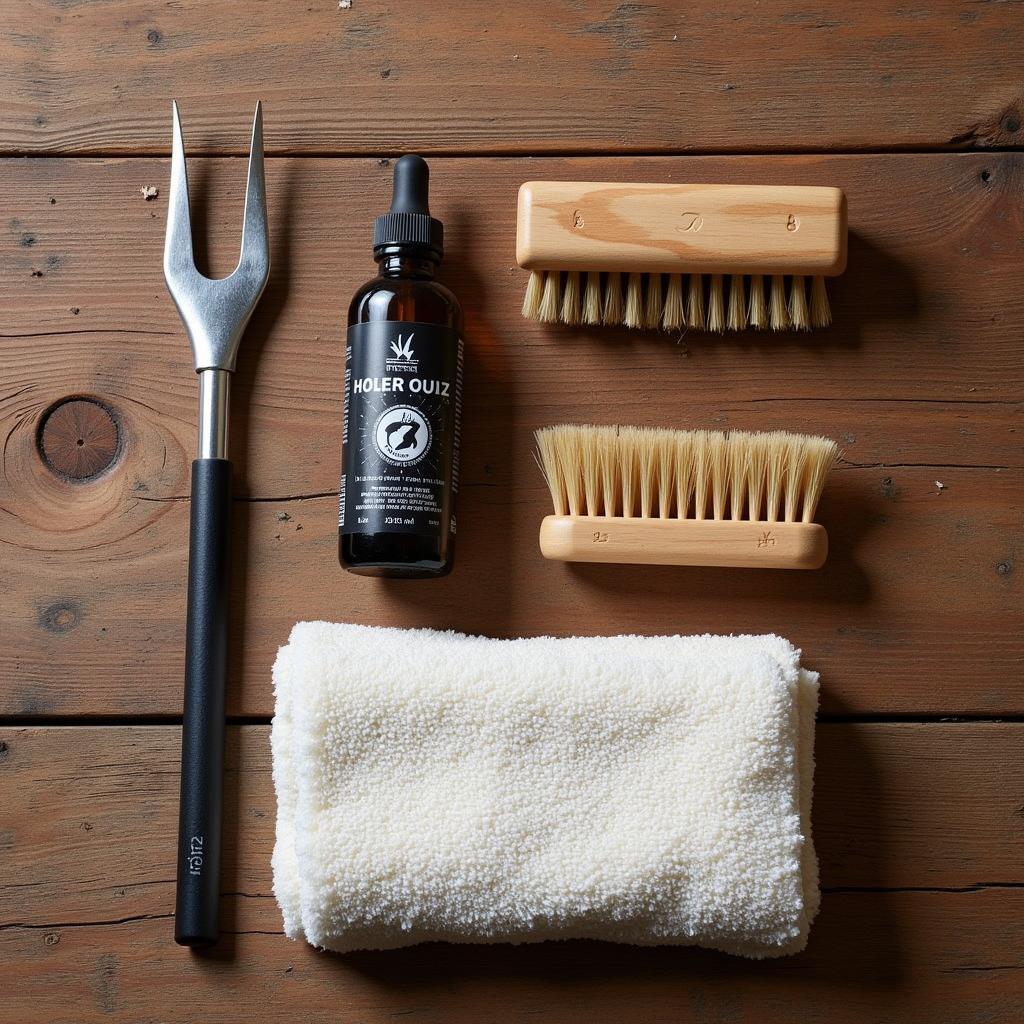Maintaining healthy hooves is crucial for any horse, but it’s particularly important for sport horses who endure rigorous training and competition schedules. Their hooves are subject to significant stress, making proper care essential for their overall well-being and performance. One of the most basic yet crucial aspects of hoof care is using hoof oil. The right hoof oil can make a significant difference in preventing common hoof problems and ensuring your equine athlete stays at the top of their game.
 Applying Hoof Oil to a Sport Horse
Applying Hoof Oil to a Sport Horse
Understanding Hoof Oil and Its Benefits
Hoof oil is a topical product specifically designed to moisturize and protect a horse’s hooves. Think of it as a good moisturizer for your horse’s hooves, keeping them hydrated and healthy.
Here’s why hoof oil is essential for your sport horse:
- Moisture Balance: Just like our skin, horse hooves need a proper moisture balance. Hoof oil helps retain natural moisture, preventing dryness, cracks, and brittleness, especially in varying weather conditions.
- Protection: It acts as a barrier against external threats like urine, manure, and mud, which can harbor bacteria and fungi that lead to infections.
- Flexibility and Support: A well-hydrated hoof is a flexible hoof. Hoof oil enhances hoof elasticity, which is crucial for absorbing shock and impact during intense activity.
Choosing the Right Hoof Oil: Key Factors to Consider
Not all hoof oils are created equal. The sheer variety of hoof oils available on the market can be overwhelming. When selecting a hoof oil for your sport horse, keep these factors in mind:
- Ingredients: Look for natural oils and ingredients like lanolin, beeswax, and essential oils known for their moisturizing and antifungal properties. Avoid products with harsh chemicals that can dry out the hoof.
- Intended Use: Some hoof oils are designed for specific purposes – moisturizing dry hooves, treating existing conditions like thrush, or promoting hoof growth. Choose a product that aligns with your horse’s needs.
- Seasonality: Consider the climate you live in. Heavier, oil-based products might be suitable for dry climates or winter, while lighter, water-based formulas are preferable for humid climates or summer.
Application Tips for Optimal Results
Applying hoof oil isn’t rocket science, but there are a few tricks to ensure you’re getting the most out of it:
- Clean Hooves: Before applying any hoof oil, ensure your horse’s hooves are clean and dry. Use a hoof pick to remove dirt, debris, and stones.
- Apply Evenly: Use a brush to apply a thin layer of hoof oil to the entire hoof, including the sole, walls, and coronary band (where the hair meets the hoof).
- Let it Absorb: Allow the hoof oil to absorb completely before turning your horse out or riding. This prevents the oil from attracting dirt and debris.
Common Hoof Problems in Sport Horses and How Hoof Oil Can Help
Sport horses are prone to specific hoof problems due to their demanding routines:
- Brittle Hooves: Frequent concussion on hard ground can lead to brittle hooves that are prone to chipping and cracking. Hoof oil helps restore moisture and improve hoof elasticity, reducing the risk of these problems.
- Thrush: Thrush is a bacterial infection that thrives in damp, dirty environments. While hoof oil isn’t a cure for thrush, it creates a protective barrier that can help prevent its occurrence. Choose a hoof oil with antibacterial properties for added protection.
- Abscesses: An abscess is a painful infection within the hoof. While hoof oil won’t treat an existing abscess, maintaining healthy, hydrated hooves with regular hoof oil application can minimize the risk of cracks and injuries that can lead to abscesses.
Expert Insights on Hoof Care
“Many horse owners underestimate the importance of routine hoof care,” says Dr. Sarah Williams, a renowned equine veterinarian. “Regular hoof oil application, combined with proper nutrition and farrier care, is fundamental to maintaining sound hooves in sport horses. A well-maintained hoof is a healthy hoof.”
Going Beyond the Basics: Additional Hoof Care Tips for Sport Horses
- Regular Farrier Visits: Schedule regular farrier appointments (every 6-8 weeks) for trimming and shoeing. This ensures proper hoof balance and addresses any developing issues promptly.
- Nutrition Matters: A balanced diet rich in vitamins and minerals, especially biotin, contributes significantly to hoof health. Consult with your veterinarian for appropriate dietary recommendations.
- Listen to Your Horse: Pay attention to any signs of lameness, hoof sensitivity, or changes in hoof condition. Early detection and intervention are key to preventing minor issues from becoming major problems.
 Essential Hoof Care Tools
Essential Hoof Care Tools
Conclusion: Invest in Your Sport Horse’s Hoof Health
Just like you wouldn’t run a marathon without taking care of your feet, don’t expect your sport horse to perform at its best without prioritizing hoof health. Hoof oil is a simple yet powerful tool in your hoof care arsenal. By choosing the right product and incorporating it into a consistent hoof care routine, you can contribute to your equine athlete’s comfort, well-being, and longevity in their chosen discipline.
Frequently Asked Questions About Sport Horse Hoof Oil
Q: How often should I apply hoof oil to my sport horse’s hooves?
A: This depends on your horse’s individual needs and the climate. As a general rule, applying hoof oil 2-3 times a week is a good starting point. However, if you live in a dry climate or your horse has particularly dry hooves, you might need to apply it more frequently.
Q: Can I use hoof oil on a horse with shoes?
A: Yes, hoof oil can be applied to the hoof wall and any exposed areas of the hoof even if your horse is shod.
Q: Is hoof oil necessary if my horse eats a well-balanced diet?
A: While a good diet is essential for hoof health, hoof oil provides additional topical moisture and protection that can benefit all horses, including those on balanced diets.
Q: Can hoof oil cure hoof infections?
A: Hoof oil is not a substitute for veterinary care. While some hoof oils have antifungal and antibacterial properties, they are primarily preventative. If you suspect your horse has a hoof infection, consult your veterinarian for proper diagnosis and treatment.
Q: What are some signs of unhealthy hooves?
A: Some signs to watch out for include cracks in the hoof wall, dry and brittle hooves, a foul odor, lameness, or sensitivity to touch. If you notice any of these signs, consult your farrier or veterinarian.
Need more information on essential horse care products? Check out our guide to things to buy for horses.
For personalized advice on choosing the right hoof oil for your sport horse, contact us today! Call us at 0772127271, email us at [email protected], or visit us at QGM2+WX2, Vị Trung, Vị Thuỷ, Hậu Giang, Việt Nam. We’re here to support you and your equine partner 24/7.